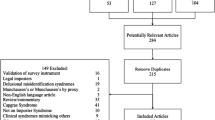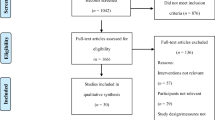Abstract
This exploratory study aimed to develop greater insight into the occupational and personal nature of the practice of mental healthcare on operational deployments. Twenty-eight British military mental health professionals were identified as having recently returned from deployment, with 35% agreeing to participate in semi-structured qualitative interviews. Results suggest that whilst this population have a range of stressors, their main concern is to work towards the success of the overall mission objectives, mainly through achieving their clinical goals. Such work is impacted by challenges such as ethical difficulties, professional obstacles, bonding with colleagues and personal issues. They do however rely upon a range of intra and inter-personal strategies to overcome these hurdles successfully. A number of suggestions for improved mental healthcare on deployment are also identified. A review of the implications of the findings is offered and recommendations for improved training and support for mental healthcare professionals are explored. Finally, potential avenues for future research are considered.

Similar content being viewed by others
Notes
The research was conducted at a time when the lead author was employed by the NHS.
The authors have a background in the research, teaching, and application of clinical psychology; including professional experience in military psychology and/or psychology trauma.
References
Adler, A. B., & Barton, P. T. (1999). International survey of military mental health professionals. Military Medicine, 164, 788–792.
Barker, C., Pistrang, N., & Elliott, R. (2002). Research methods in clinical psychology: An introduction for students and practitioners. Chichester: Wiley.
Bekerian, D. A., & Levey, A. B. (2005). The war room. Applied psychology: putting theory into practice. Oxford: Oxford University Press.
Campion, B. H., Hacker Hughes, J. G. H., Devon, M., & Fear, N. T. (2006). Psychological morbidity during the 2002 deployment to Afghanistan. Journal of the Royal Army Medical Corps, 152, 91–93.
Chamberlain, K. (1999). Using grounded theory in health psychology. In M. Murray & K. Chamberlain (Eds.), Qualitative health psychology: Theories and methods. London: Sage.
Creswell, J. (1998). Qualitative inquiry and research design: Choosing among five traditions. London: Sage.
DuBrin, A. J. (1996). Human relations for career and personal success. Englewood Cliffs: Prentice Hall.
Engel, C., & Campbell, S. (1993). Revitalizing division mental health in garrison: a post-desert storm perspective. Military Medicine, 158(8), 533–537.
Gal, R., & Mangelsdorff, A. D. (Eds.). (1991). Handbook of military psychology. Chichester: Wiley.
Giles, D. C. (2002). Advanced research methods in psychology. London: Routledge.
Glaser, B., & Strauss, A. (1967). The discovery of grounded theory. Chicago: Aldine.
Hacker Hughes, J. G. H. (2004a). Uniformed military clinical psychology (Internal Rep.: ACDMH/JHH). London, UK: Defence Medical Services, Ministry of Defence.
Hacker Hughes, J. G. H. (2004b). Military psychology services in some other nations (Internal Rep.: Supplement to Annex A to ACDMH/JHH). London, UK: Defence Medical Services, Ministry of Defence.
Hacker Hughes, J. G. H. (2004c). Military psychology services in three leading allied nations. (Internal Rep.Annex B to ACDMH/JHH). London, UK: Defence Medical Services, Ministry of Defence.
Hacker Hughes, J. G. H., Cameron, F., Eldridge, R., Devon, M., Wessely, S., & Greenberg, N. (2005). Going to war does not have to hurt: preliminary findings from the British deployment to Iraq. British Journal of Psychiatry, 186, 536–537.
Hacker Hughes, J. G. H., Campion, B. H., Cameron, C. & Devon, M. (2003). Results of a survey on psychological health of British peacekeepers deployed during 2002. European Psychotherapy, Special Edition, 204.
Hoge, C. W., Castro, C. A., Messer, S. C., et al. (2004). Combat duty in Iraq and Afghanistan: mental health problems and barriers to care. New England Journal of Medicine, 35, 13–22.
Jenkins, I. L. (2006). Surgeon general’s policy letter—The prevention and management of traumatic stress related disorders in armed forces personnel deployed on operations. (Internal Rep.: DMSD/13/8). London, UK: Defence Medical Services, Ministry of Defence.
Jones, N., Greenberg, N., Fear, N., Earnshaw, M., McAllister, P., Reid, G., et al. (2008). The operational mental health consequences of deployment to Iraq for UK forces. Journal of the Royal Army Medical Corps, 154(2), 102–106.
Kiernan, M., Hill, D., McManus, F., & Turner, M. (2003). Management of mental illness by the British army. The British Journal of Psychiatry, 182, 337–341.
Lester, K. S. (2000). The psychologist’s role in the garrison mission of combat stress control units. Military Medicine, 165(6), 459–463.
McAllister, P. D., Blair, S. P. R., & Philpott, S. (2004). Op telic—A field mental health team in the general support medical setting. Journal of the Royal Army Medical Corps, 150, 107–112.
McCauley, M. (2010). Rising to the challenge: civilian clinical psychology in the USAF. The Air Force Psychologist, 30(1), 6–7.
McCauley, M., Hacker Hughes, J., & Liebling-Kalifani, H. (2008). Ethical considerations for military clinical psychologists: a review of selected literature. Military Psychology, 20, 7–20.
McCauley, M., Hacker Hughes, J., & Liebling-Kalifani, H. (2010). Wellbeing of military mental health staff. Mental Health Practice, 14(4), 14–19.
McCauley, M., Norris, R., & Searle, Y. (2006). Mental healthcare at the royal centre for defence medicine. (Internal Rep.BZN/ClinPsyc03/06/McC/DCMH). (London, UK: Defence medical services, ministry of defence.
Moore, B. A., & Reger, G. M. (2006). Clinician to frontline soldier: a look at the roles and challenges of army clinical psychologists in Iraq. Journal of Clinical Psychology, 62(3), 395–403.
Palmer, I. (2003). No pain, no gain–part 1. A brief history of British army psychiatry: origins, experiences and understandings. Journal of the Royal Army Medical Corps, 149, 364–368.
Palmer, I. (2004). Psychological briefing, prevention or priming? or, how many psychiatrists does it take to change a mind? Journal of the Royal Army Medical Corps, 150, 84–90.
Reid, G. (2008). Forward. Journal of the Royal Army Medical Corps, 154(2), 90.
Shephard, B. (2002). A war of nerves: soldiers and psychiatrists 1914–1994. London: Pimlico.
Silverman, D. (1993). Interpreting qualitative data: Methods for analysing talk, text and interaction. In D. Silverman (2000). Doing qualitative research: A practical handbook. London: Sage
Strauss, A., & Corbin, J. (1990). The basics of qualitative research: grounded theory procedures and techniques. California: Sage.
Timlin-Scalera, R. M., Ponterotto, J. G., Blumberg, F. C., & Jackson, M. A. (2003). A grounded theory study of help-seeking behaviours among white male high school students. Journal of Counseling Psychology, 50(3), 339–350.
Tindall, C. (2001). Issues of evaluation. In P. Banister, E. Burman, I. Parker, M. Taylor, & C. Tindall (Eds.), Qualitative methods in psychology: A research guide. Buckingham: Open University Press.
Turner, M. A., Kiernan, M. D., McKechanie, A. G., Finch, P. J. C., McManus, F. B., & Neal, L. A. (2005). Acute military psychiatric casualties from the war in Iraq. British Journal of Psychiatry, 186, 476–479.
Author information
Authors and Affiliations
Corresponding author
Rights and permissions
About this article
Cite this article
McCauley, M., Liebling-Kalifani, H. & Hughes, J.H. Military Mental Health Professionals On Operational Deployment: An Exploratory Study. Community Ment Health J 48, 238–248 (2012). https://doi.org/10.1007/s10597-011-9407-8
Received:
Accepted:
Published:
Issue Date:
DOI: https://doi.org/10.1007/s10597-011-9407-8




